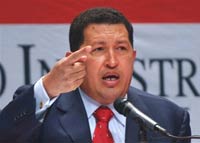Venezuela's Chavez lobbies South America with petrodollar largesse
Venezuelan President Hugo Chavez sought to expand his petrodollar influence in South America as he launched a four-nation tour to promote his country's entry into a regional trade bloc and to offer energy and financial deals to allies.

Chavez met with Argentine President Nestor Kirchner late Monday after signaling Venezuela plans to acquire up to US$1 billion (EUR 720 billion) in Argentine bonds in installments - the latest in a series of deals cementing ties between the allies.
"This is an important deal, highly important for our political and geopolitical ties," Chavez said.
He later joined Kirchner for a televised ceremony at the Government House in Buenos Aires in which the leaders agreed to a "treaty on energy security."
The agreement calls for "ample and sustained cooperation" on energy initiatives including the supply and distribution of natural gas through pipelines, joint oil refining projects and coordinated efforts on distributing power and alternative fuels.
Chavez said his government would invest in a regasification plant for liquid natural gas for Argentina, which is currently weathering an energy crisis. He said the plant could be completed within two years.
Chavez offered few details, but local reports said construction at a still-to-be-determined site would require at least US$400 million (EUR 289 million).
Kirchner responded to criticism over Argentina's sporadic natural gas and other energy shortfalls by blaming the shortages on unexpectedly robust economic growth after the country rebounded from a deep 2002 economic tailspin.
"Argentina is growing and it therefore requires more energy," he said.
Kirchner also said he strongly supports Chavez's bid to make Venezuela a full member of the South American trade bloc Mercosur, joining Argentina, Brazil, Paraguay and Uruguay.
Argentine and Uruguayan lawmakers have approved Venezuela's entry into Mercosur, but legislators in member states Paraguay and Brazil have yet to sign off amid controversy over Chavez's confrontation with an opposition-aligned television station.
Several Brazilian lawmakers favor blocking Venezuela's entry, arguing the country does not comply with Mercosur's commitment to democracy because of Chavez's decision not to renew the broadcast license of Radio Caracas Television, or RCTV.
Chavez was making his first visit to Argentina since March, when the anti-U.S. gadfly used a rally in a soccer stadium to rail against U.S. President George W. Bush.
Chavez also met with Kirchner's wife, Cristina Fernandez de Kirchner, who is running to replace her husband in Oct. 28 presidential elections.
"Even the stones in Argentina and Venezuela shout out that Cristina Kirchner will be president," Chavez said.
Chavez was to fly Tuesday to Uruguay and later this week to Bolivia and Ecuador on what analysts called a trip to assert influence in the region.
"Chavez's frenetic petro-diplomacy is back in full swing," said Michael Shifter at the Inter-American Dialogue think tank in Washington. "His purchase of Argentine bonds makes sense for both him and the Kirchner government right now. Chavez wants to keep inflationary pressures in Venezuela in check and try to further extend his political influence in South America."
"But it is doubtful whether Chavez will be able to solidify his anti-U.S. coalition in South America through his largesse," Shifter said.
He cited signs that some countries in the region are looking to expand their relationships based on pragmatism.
Subscribe to Pravda.Ru Telegram channel, Facebook, RSS!


